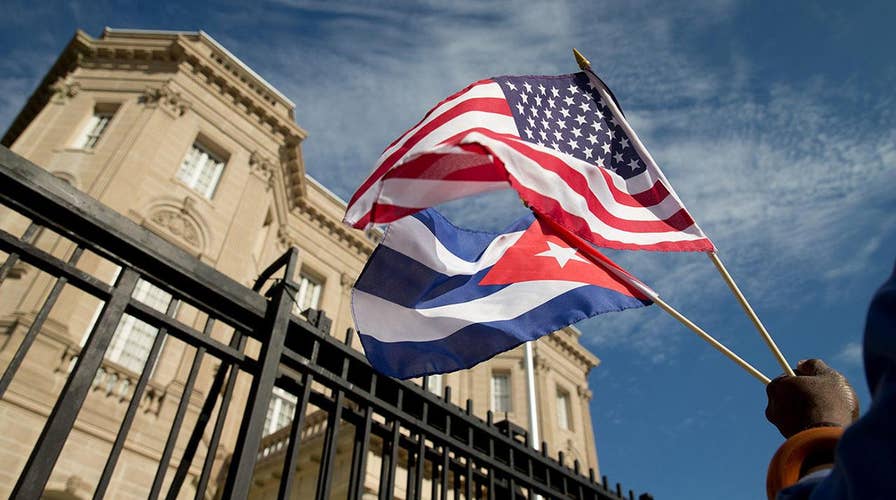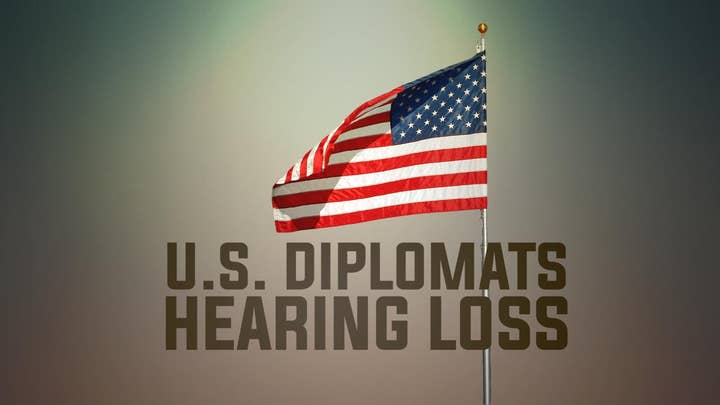US orders massive Cuba staff reduction after 'sonic attacks'
Rich Edson reports on the State Department's decision.
The mysterious high-pitched buzzing sound associated with the so-called "sonic attacks" on nearly 40 U.S. and Canadian diplomats living in Cuba may have been caused by a neurotoxic agent used to kill mosquitoes, a new study commissioned by the Canadian government claims.
The strange incidents started in late 2016, when U.S. and Canadian embassy personnel began seeking medical care for hearing loss and ear-ringing that were eventually linked to weird noises or vibrations. Investigators initially suspected the diplomats were victims of malicious sonic attacks, though Cuba has strongly denied the accusation. Things got so bad that the U.S. and Canada cut its embassy staff, citing the medical mystery that's now referred to as the "Havana Syndrome."
CANADIAN DIPLOMATS' SUE GOVERNMENT FOR 'DOWNPLAYING THE SERIOUSNESS' OF MYSTERY ILLNESS IN CANADA
There have been various theories floated – everything from crickets to microwave weapons – as to the cause of the headaches, dizziness and other concussion-like symptoms.
Global Affairs Canada commissioned a clinical study to get to the bottom of the case.
"The working hypothesis actually came only after we had most of the results," Alon Friedman, the study's lead author, told Canada's CBC News.
Friedman's team of researchers studied 26 Canadians, which included a control group that had never lived in Havana.
Doctors, scientists and researchers conducted thorough assessments of the Canadians' symptoms and performed multiple blood and brain imaging tests. They detected different levels of brain damage in an area that causes symptoms reported by the diplomats and is susceptible to neurotoxins. They found that a key enzyme required for proper brain functioning of the nervous system called cholinesterase was being blocked. They then noted that certain classes of pesticides work by inhibiting cholinesterase and that Cuba, like many other tropical islands, regularly sprays pesticides to kill insects that carry diseases.
The researchers then noted that in 2016, Cuba "launched an aggressive campaign against mosquitoes to stop the spread of the Zika virus."
Embassy records showed that offices, as well as the inside and outside of diplomatic residences, were sprayed five times more frequently than under normal circumstances. Toxicology reports of the Canadian victims confirmed the presence of pyrethroid and organophosphate — two agents commonly found in fumigation products.
"There are very specific types of toxins that affect these kinds of nervous systems...and these are insecticides, pesticides, organophosphates—- specific neurotoxins," Friedman said.
Researchers were also able to find a correlation between the test subjects most affected by the symptoms and the number of fumigations that were performed at their work and homes.
Friedman added that it was not clear whether the broader Cuban population was affected by all the fumigations and if not, why. He said his team alongside Cuban scientists would look into those topics in the future.
"We (will) continue the research in other ways to try to confirm which of the toxins is more toxic, at what levels - many things are not known yet," Friedman said.
Over the course of two years, several studies and theories have surfaced over the puzzling case.
In January, a pair of researchers at the University of California, Berkeley and the University of Lincoln in the United Kingdom blamed the piercing sounds on short-tailed crickets native to Cuba known as Anurogryllus celerinictus. While The New York Times reported the high-pitched noises were microwave weapons, others claimed the diplomats' ailments were due to rogue viruses. Some also believed that previous trauma was the real culprit.
Medical sociologist Robert Bartholomew chalked it all up to trumped-up hysteria.
"Think of mass psychogenic illness as the placebo effect in reverse," he told Vanity Fair. "You can often make yourself feel better by taking a sugar pill. You can also make yourself feel sick if you think you are becoming sick."
CLICK HERE FOR THE FOX NEWS APP
Cindy Calkin, a psychiatrist and member of the Canadian research team, pushed back on the idea of mass hysteria.
"I have interviewed all but one or two of (the victims) and I haven't found any evidence of psychiatric disorder," she told CBC News. "This is a very strong group, very resilient and there is no evidence of mass hysteria. Part of the diagnostic of mass hysteria is that there is no underlying other medical causes that can be found. And we (found) underlying medical evidence."










































